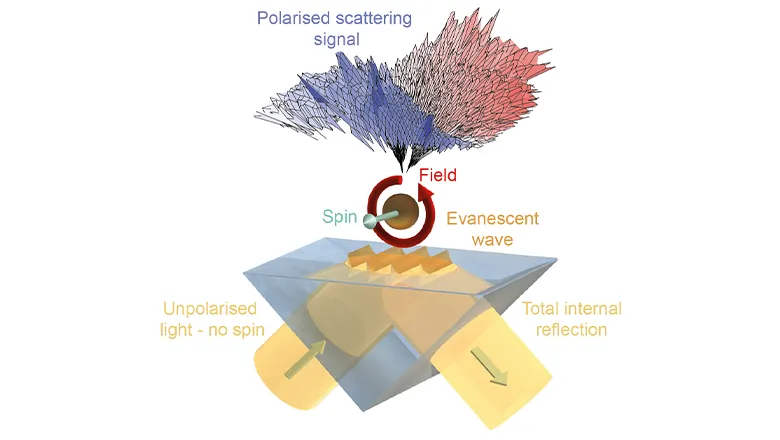
Dr Francisco Rodríguez Fortuño
Reader
Research interests
- Physics
Biography
Novel Nanophotonic Phenomena Team - Research group website: members, publications and news.
Biography
Francisco José Rodríguez-Fortuño is a Lecturer at King's College London, where he carries out research on the topics of plasmonic devices, nano-optics, optical forces, optical nanoantennas, metamaterials and novel electromagnetic phenomena. After obtaining a degree in Telecommunications Engineering in 2008 at the Universitat Politècnica de València (UPV), Spain, he carried out his Masters' and PhD studies at UPV in the topic of plasmonic metamaterials. During his PhD, Francisco spent 9 months as a visiting researcher at the University of Pennsylvania, USA, 2011 under the supervision of Prof. Nader Engheta and 7 months at King's College London, UK, 2012, under the supervision of Prof. Anatoly Zayats and Dr. Gregory Wurtz, where he later worked as a Postdoctoral Research Assistant in 2014 and obtained a Lecturer position in 2015. Francisco has authored or co-authored 25 research papers and contributed 38 works at international conferences. He has received several academic performance distinctions and several prizes for his PhD work. Francisco is a member of the editorial board of Scientific Reports, Nature Publishing Group.
Research
Francisco is fascinated by novel and exotic optical phenomena at the nanoscale. His research career had its foundations on optical metamaterials and plasmonics at infrared and visible wavelengths, with both theoretical and experimental works in nanofabricated negative refractive index materials, and plasmonic sensing.
Francisco's research evolved into studying extreme optical parameter metamaterials (permittivity-near-zero) and novel optical forces. Later, Francisco described an unknown fundamental effect linking optical helicity to directional excitation of electromagnetic modes, with a successful experimental demonstration, leading him to research on spin-orbit coupling of light and the subsequent experimental demonstration of polarization dependent silicon nanoantennas for infrared radiation polarization analysis and synthesis.
Currently, Francisco's research combines the topics of plasmonics, nanophotonics, extreme parameter metamaterials, hyperbolic metamaterials, spin-orbit coupling, optical nanoantennas, and optical forces, developing novel theoretical concepts in optics and plasmonics, and always aiming at their experimental demonstration and practical applications.
Research

Photonics & Nanotechnology
The research in the group involves the development and applications of advanced photonic technologies and of novel nanomaterials to address modern challenges in photonic and quantum technologies, new nanostructured materials, sensing, imaging and clean energy.
News
Experiment reveals light rotating objects in a direction never seen before
Whirlpools of light exert force 100,000 times greater than seen before in possible breakthrough for the optical manipulation of matter and quantum...
Nanostrand newsletter available for download
Nanostrand is the newsletter for the Photonics & Nanotechnology Group and the Biological Physics and Soft Matter Group in the Department of Physics.

King's research illuminates new understanding on optical spin
Latest research from King’s physicists challenges common understanding of what photon spin is.

Levitating nanoparticles using light: conveyor belts of the future
A new levitation phenomenon has wide-ranging future applications in nanomechanical devices including nano-conveyer belts.

Festive science for local schools at Christmas Lectures 2017
On Tuesday 5 December, the Faculty of Natural & Mathematical Sciences’ Christmas Lectures 2017 brought a festive flavour to the research being undertaken...

Research

Photonics & Nanotechnology
The research in the group involves the development and applications of advanced photonic technologies and of novel nanomaterials to address modern challenges in photonic and quantum technologies, new nanostructured materials, sensing, imaging and clean energy.
News
Experiment reveals light rotating objects in a direction never seen before
Whirlpools of light exert force 100,000 times greater than seen before in possible breakthrough for the optical manipulation of matter and quantum...
Nanostrand newsletter available for download
Nanostrand is the newsletter for the Photonics & Nanotechnology Group and the Biological Physics and Soft Matter Group in the Department of Physics.

King's research illuminates new understanding on optical spin
Latest research from King’s physicists challenges common understanding of what photon spin is.

Levitating nanoparticles using light: conveyor belts of the future
A new levitation phenomenon has wide-ranging future applications in nanomechanical devices including nano-conveyer belts.

Festive science for local schools at Christmas Lectures 2017
On Tuesday 5 December, the Faculty of Natural & Mathematical Sciences’ Christmas Lectures 2017 brought a festive flavour to the research being undertaken...

